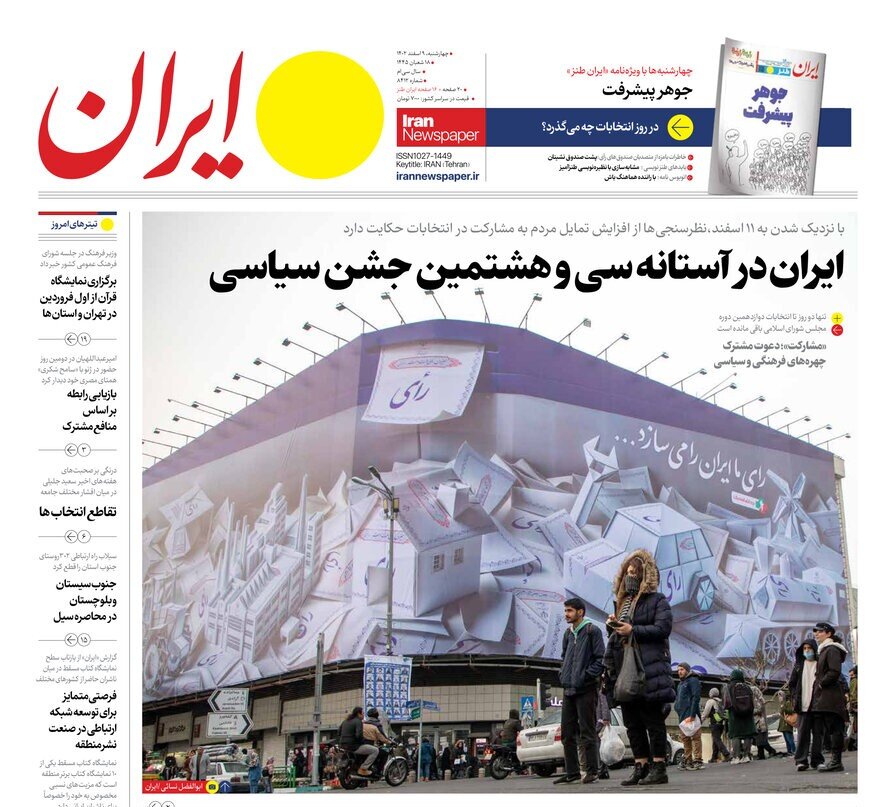TEHRAN PAPERS

TEHRAN - The Iran newspaper pointed to Iran's nuclear issue.
It wrote: With the expansion of the scope of the Gaza war and the efforts of the Zionist leaders to involve Iran in this conflict, it was predictable that the negotiations to lift the sanctions on Iran would stop and the extremists in Western-Zionist circles would focus on putting pressure on Iran through the IAEA. It was in such a situation that (IAEA chief) Grossi tried to attract the attention of public opinion, media, and political circles in Western countries to his dissatisfaction with the process of cooperation with Tehran through numerous interviews. However, the recent IAEA report, which indicates a 5% reduction in Iran's 60% enrichment rate, shows that Iran does not intend to violate its unshakable position despite the IAEA's excuses. In this regard, no resolution against Iran will be approved at the next meeting of the IAEA Board of Governors. This shows that despite the false claims of Western-Zionist circles, Iran, unlike the Zionist regime, still adheres to its commitments in the framework of nuclear safeguards.
Shargh: Increasing China's motivations
In an analysis, Shargh discussed China's policies toward the Persian Gulf countries and said: China has never been interested in accepting the responsibilities of a "security guarantor", which is the stated goal of American bases in the Persian Gulf. However, the Chinese base in the UAE may be an indication of China's plan for its military presence in the region, which is actually a covert presence. Beijing must also balance its relations with its Arab partners and Iran. On the one hand, its defense relations with Tehran go back several decades. On the other hand, economic relations with Saudi Arabia, the UAE and similar countries are more profitable than anything Iran can offer. China has yet to see any signs of apparent friction in relations with Tehran and Riyadh at the same time, but managing expectations with Tehran and its Arab rivals may become an issue. Riyadh has shown a willingness to take action against major powers that are partners with Iran (for example, voting to condemn Russia's attack on Ukraine at the United Nations).
Javan: Tehran's red lines in geopolitical changes in the Caucasus
In an article, Javan dealt with the geopolitical changes in the Caucasus. It quoted Ahmad Kazemi, a senior researcher in Eurasia, as saying: Iran's red line toward any geopolitical changes in the Caucasus is clear, and the necessary messages and warnings have been sent in this regard. The development of cooperation between Iran and Armenia in the field of reconstruction of transit roads in the form of the Persian Gulf-Black Sea corridor is important. The project of the "Aras Corridor" between Tehran and Baku is a basic idea to end the geopolitical conspiracy in the Caucasus.
Kazemi also referred to the Al-Aqsa Storm Operation and the persistence of the Palestinian resistance movement against the crimes of the Zionist regime and considered the failure of the threat from the Zionist regime against Iran in the Caucasus as one of the results of these developments. Iran is fully prepared to face any geopolitical adventures in this region and believes that the mistakes of the enemies can create an opportunity for Tehran to compensate for some shortcomings to clean Zionism from the Caucasus region.
Ham Mihan: Iran's approach to prevent the creation of Zangezur corridor
In a commentary, Ham Mihan wrote: If the Republic of Azerbaijan has not taken action to create the Zangezur corridor, it is partly related to Iran's policies and actions. Iran's capacities in the form of encouragement and punitive measures have prevented the formation of such a corridor. Among Iran's encouraging measures, we can mention the agreement between Iran and the Republic of Azerbaijan to establish the Aras corridor, and among the punitive measures, we can mention Iran's military maneuvers in the northwest of the country, as well as the establishment of a consulate in Kapan, Armenia. All the actions that Iran has taken were aimed at stabilizing the situation in the region. If Baku imagines that Iran's reaction will be serious, decisive and effective, then it will avoid actions that disrupt the current status. But if Baku imagines that Tehran is not in a position to react strongly, it may use force. Baku may miscalculate and misperceive Iran’s status. In that case, the situation in the region may go out of control.

No comments:
Post a Comment